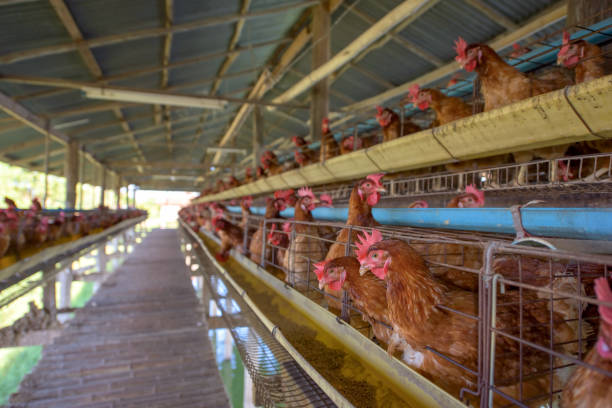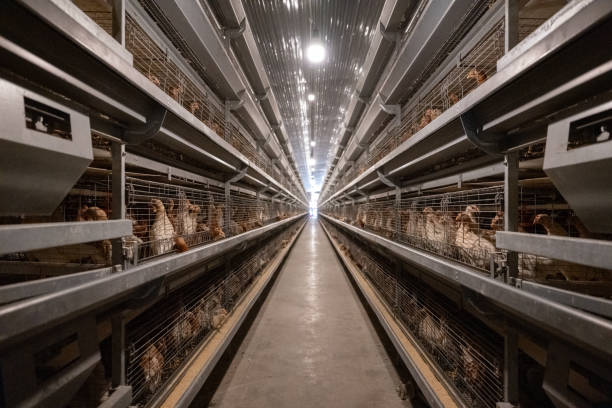What Are the Advantages and Disadvantages of Free Range Poultry Farming?
Time : 2024-06-27
Free range poultry farming has gained popularity worldwide due to its perceived benefits for both the birds and the consumers. This method allows chickens to roam freely outdoors, which has numerous implications for their health, behavior, and the quality of the products they produce. However, like any farming method, it comes with its own set of challenges. This article will explore the advantages and disadvantages of free range poultry farming, compare it to organic poultry farming, and discuss how LIVI Poultry Equipment Factory can support various farming methods with their high-quality equipment.
Advantages of Free Range Poultry Farming
Improved Animal Welfare
One of the most significant advantages of free range poultry farming is the improved welfare of the birds. Chickens are allowed to roam freely, engage in natural behaviors such as foraging, pecking, and dust bathing, which leads to a higher quality of life.
- Natural Living Conditions: Free range farming provides a more natural environment for chickens compared to conventional cage systems.
- Reduced Stress Levels: Birds that can move freely experience lower stress levels, which can lead to better overall health and productivity.
Healthier Birds and Products
Free range poultry farming often results in healthier birds and higher-quality products. The natural diet and exercise that free range chickens receive can have positive effects on their health and the quality of their eggs and meat.
- Enhanced Nutrition: Free range chickens consume a varied diet, including insects and plants, which can lead to eggs and meat with higher nutritional value.
- Lower Disease Incidence: Birds in free range systems often have lower incidences of certain diseases due to increased exercise and exposure to fresh air and sunlight.
Environmental Benefits
Free range poultry farming can have positive environmental impacts, particularly when managed sustainably.
- Soil Fertility: Chickens in free range systems contribute to soil fertility through their droppings, which act as a natural fertilizer.
- Biodiversity: Allowing chickens to forage can help control pests and promote biodiversity in the farming environment.
Market Demand and Premium Pricing
There is a growing consumer demand for ethically produced food, including free range poultry products. This can translate into higher market prices and better profitability for farmers.
- Consumer Preference: Many consumers are willing to pay a premium for products that are perceived to be more humane and environmentally friendly.
- Brand Differentiation: Farmers can differentiate their products in the market by promoting the benefits of free range farming.

Disadvantages of Free Range Poultry Farming
Higher Production Costs
One of the main disadvantages of free range poultry farming is the higher production costs compared to conventional methods.
- Land Requirements: Free range systems require more land to allow chickens to roam freely, which can be a significant investment.
- Infrastructure Costs: Additional infrastructure, such as fencing and shelter, is necessary to protect the birds and manage their environment.
Increased Risk of Predation and Disease
Free range poultry farms are more susceptible to predation and certain diseases compared to enclosed systems.
- Predation: Free range chickens are at a higher risk of predation from wild animals, which can result in losses.
- Disease Exposure: Birds in free range systems may be exposed to parasites and diseases from the environment and other wildlife.
Management Challenges
Managing a free range poultry farm can be more complex and labor-intensive than conventional farming methods.
- Monitoring and Control: Keeping track of the birds, ensuring they return to shelter, and monitoring their health requires more time and effort.
- Weather Dependence: Free range farming is more dependent on weather conditions, which can affect the birds’ well-being and productivity.
Variable Productivity
The productivity of free range poultry farming can be less consistent compared to conventional systems.
- Egg Production: Free range hens may lay fewer eggs than those in controlled environments due to the variability in their diet and conditions.
- Growth Rates: The growth rates of free range chickens can be slower, impacting the timing and quantity of meat production.
Comparing Free Range and Organic Poultry Farming
Similarities
Both free range and organic poultry farming emphasize animal welfare and environmental sustainability. They often share similar practices, such as providing outdoor access and feeding birds a natural diet.
- Natural Behaviors: Both methods allow chickens to exhibit natural behaviors, reducing stress and improving welfare.
- Environmental Impact: Both practices aim to minimize the environmental footprint of poultry farming through sustainable practices.
Differences
While there are similarities, there are also key differences between free range and organic poultry farming.
- Feed and Medication: Organic farming requires certified organic feed and restricts the use of synthetic medications and additives, whereas free range farming does not have such stringent requirements.
- Certification: Organic farming is subject to strict certification standards and regulations, which can differ from the requirements for free range farming.
Advantages of Organic Poultry Farming
- Healthier Products: Organic poultry products are often perceived as healthier due to the absence of synthetic chemicals and the use of organic feed.
- Market Premium: Organic products typically command a higher price in the market, providing better profitability for farmers.

Supporting Free Range Poultry Farming with LIVI Poultry Equipment Factory
High-Quality Equipment
LIVI Poultry Equipment Factory, established in 1990, offers a range of high-quality equipment that can support both free range and conventional poultry farming methods. Their products include:
- A-Type Laying Hen Cages: Suitable for small to medium-scale farms.
- H-Type Laying Hen Cages: Ideal for large-scale commercial farms.
- H-Type Broiler Cages: Designed for raising broilers efficiently.
- Broiler Flat Farming Equipment: Suitable for broiler farms with flat rearing systems.
- Automated Auxiliary Equipment: Includes feeding, watering, and egg collection systems.
Affordable and Durable Solutions
LIVI Poultry Equipment Factory provides affordable and durable solutions to support poultry farmers in maximizing efficiency and productivity. Their products are designed to withstand the demands of various farming environments, ensuring long-term use and reducing the need for frequent replacements.
Comprehensive After-Sales Services
LIVI Poultry Equipment Factory offers comprehensive after-sales services, including installation support, maintenance, and technical assistance. This ensures that poultry farmers can get the most out of their equipment and maintain high standards of animal welfare and productivity.
Conclusion
Free range poultry farming offers numerous advantages, including improved animal welfare, healthier birds and products, environmental benefits, and the potential for premium pricing. However, it also presents challenges such as higher production costs, increased risk of predation and disease, management complexities, and variable productivity.
Comparing free range with organic poultry farming reveals both similarities and differences, with each method offering unique benefits. Free range farming emphasizes natural behaviors and environmental sustainability, while organic farming focuses on health benefits and market premiums.
LIVI Poultry Equipment Factory supports poultry farmers with high-quality, affordable, and durable equipment, making it easier to implement and manage various farming methods. Their comprehensive after-sales services further ensure that farmers can maintain high standards of animal welfare and productivity.
By carefully considering the advantages and disadvantages of free range poultry farming, farmers can make informed decisions that align with their goals and resources, ultimately contributing to a successful and sustainable poultry farming venture.











